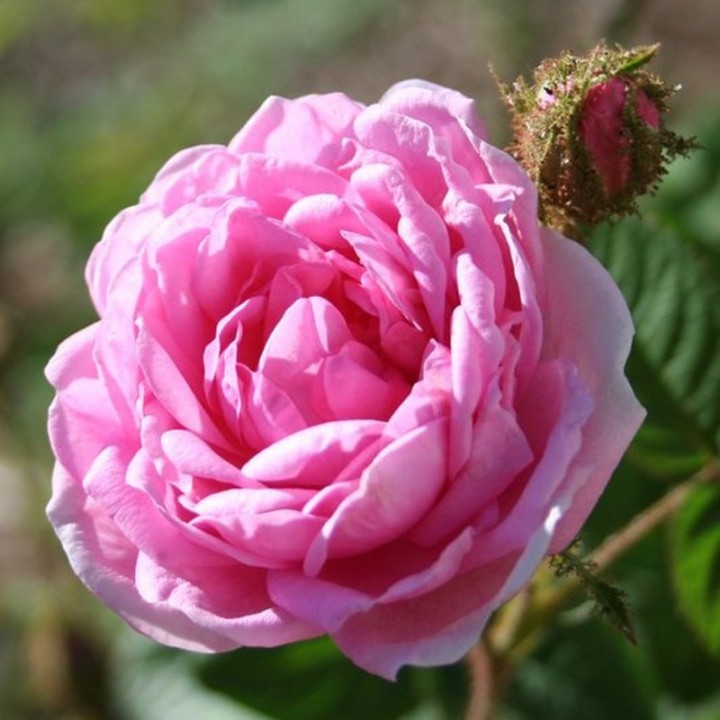
Rosa Centifolia and Health.
Author.
Hayk S. Arakelyan. Full Professor in Medicine,
Doctor of Medical Sciences, Ph.D , Grand Ph.D .
Senior Expert of Interactive Clinical Pharmacology , Drug Safety,
Treatment Tactics, General Medicine and Clinical Research.
“Flowers... are a proud assertion that a ray of beauty outvalues all the utilities of the world “.
Introduction.
Rosa centifolia (lit. hundred leaved/petaled rose; syn. R. gallica var. centifolia (L.) Regel), the Provence rose or cabbage rose or Rose de Mai is a hybrid rose developed by Dutch rose breeders in the period between the 17th century and the 19th century, possibly earlier. Its parentage includes Rosa ×damascena, but it may be a complex hybrid; its exact hereditary history is not well documented or fully investigated.
Health Benefits of of Rosa Centifolia.
Rosa centifolia contains a few vitamins and antioxidants that help moisturize dry skin. Its astringent properties help tighten pores and reduce the redness and inflammation due to distended capillaries. Rosa centifolia contains a few vitamins and antioxidants that help moisturize dry skin. Its astringent properties help tighten pores and reduce the redness and inflammation due to distended capillaries. Rosa Centifolia contains up to 63% phenylethanol that gives the flower its antiseptic properties to treat acne and control skin diseases such as psoriasis and atopic dermatitis. The rose’s essential oil has also been studied and found to help in healing wounds.
The presence of Vitamin C - a powerful antioxidant – in the flower helps to protect skin cells from free radicals and prevent sunburn. The rose is also a gentle but powerful anti-depressant and is used in treating stress-related conditions. Its therapeutic scent soothes the nervous system and can help prevent panic attacks. Rosa centifolia flower extract comes from the cabbage rose and is used as a skin-conditioning agent and fragrance ingredient. Rosa Centifolia is mostly cultivated in Egypt, Morocco and France for its clear and sweet fragrance. 10,000 pounds of rose petals are required to distill just one pound of rose oil which is done through various processes like steam distillation, cold process and solvent extraction.
conditions skin, reduce skin redness, skin moisturization.
An extremely safe ingredient, Rosa Centifolia Flower extract has no known toxicity in general use and is shown to be non-irritating and suitable for sensitive skin.. It is widely cultivated for its singular fragrance—clear and sweet, with light notes of honey. The flowers are commercially harvested for the production of rose oil, which is commonly used in perfumery.
The Health Benefits of Rose Oil.
1.This aromatherapy oil may reduce stress and promote libido.
2. Rose oil is one of the most commonly used essential oils that some believe have anxiolytic (anxiety-reducing) and aphrodisiac properties.
3. When applied to the skin, rose oil may help relieve pain and inflammation while improving the overall quality of the skin. Rose oil is also one of the most widely used essential oils in the manufacture of perfumes and fragranced products.
4. Practitioners of aromatherapy believe that inhaling essential oil or absorbing it through the skin transmits signals to the limbic system (a region of the brain responsible for emotions and memories). Doing so can induce physiological effects, including a reduction in blood pressure, heart rate, and respiration as well as an increase in "feel-good" hormones like serotonin and dopamine.
5. Others believe that it can act a natural antidepressant, relieve symptoms of arthritis and gout, or treat spasmodic disorders like asthma, irritable bowel syndrome (IBS), and gastroesophageal reflux disease (GERD). Most of these claims are poorly supported by research.
Stress.
According to a 2011 study in Chemical Senses, rose oil is able to decrease levels of the stress hormone cortisol in the blood. Doing so not only alleviates the physiological symptoms of stress (including rapid heart rate, increased blood pressure, and sweating) but stimulates the so-called mesolimbic reward pathway in the brain.
If you have any questions concerning “Rosa Centifolia and Health”, interactive clinical pharmacology , or any other questions, please inform me .
Prof. Hayk S. Arakelyan.